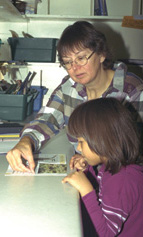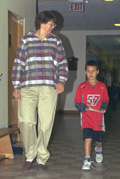|
By Pat Daley
 "We beat the bus! We beat
the kids on the bus." "We beat the bus! We beat
the kids on the bus."
At 8:25 a.m. three breathless children burst through the door of the Native
Pride Office in Robert Moore School and flop into chairs.
Dawn and her brothers Tom and Jacob missed the school bus this morning. The
neighbour who drove them from their reserve to the Fort Frances school made
the almost one-hour drive in record time. They want Darla Solomon to be the
first one to know.
Solomon is co-ordinator of the Native Student Retention Program, which is
offered by Seven Generations Education Institute with the Rainy River
District School Board. While it’s not usual for her office door to be
closed — construction elsewhere in the school basement makes a distracting
racket — it is typical for students to stop by to see her before the
school day starts.
Solomon has already been in the office for about half an hour, checking
telephone messages and e-mail, making calls and appointments, and shaping
clean milk cartons into cubes for later transformation into dice. Although
she will be working at a different school this morning, she always starts
the day at Robert Moore because she knows students like to drop by the
Native Pride Office.
At 8:35, the door is thrown open again and a jumble of seven or eight
elementary school students all try to get in at once. They want to see if
their friends who missed the bus have arrived.
Five minutes later, the room is quiet. Solomon stops by the office on her
way out to F.H. Huffman School, a few blocks away. In the confusion about
missing the school bus, Dawn had forgotten her lunch — luckily, her
brothers remembered theirs — and Solomon wants to make sure that she gets
something to eat.
"Three of our schools have food shelves now," Solomon says. She
remembers getting a call once from a parent who said she wouldn’t be
sending her child to school because they had no food.
"I thought if there’s no food to bring to school, they don’t have
food at home either," she says. "I told her to send the child to
school and we’ll make sure she gets something to eat."
While at the office, Solomon also leaves a message for the principal. They
need to talk about a Grade 7 student on in-house suspension who had gone
missing the previous day. By 6:30 that evening, Solomon had a call that he
was safe at home, but there were still going to have to be new terms worked
out to keep him in school.
As co-ordinator of the Native Student Retention Program, Solomon gets a
unique picture of her students — one that can span their school career —
because she works in every grade from JK to 8. She sees the value of
starting early to keep kids in school.
"When I first started, I saw that some of the younger children had
already started to drop out as early as Grade 3," she says. That was
four years ago, after she graduated from the two-year, part-time Aboriginal
Teacher Education Program offered by Seven Generations Education Institute
and Lakehead University.
Solomon was born and raised in North Dakota, moving to Minnesota — which
borders the town of Fort Frances — when she was 12 years old. She came to
Canada when she married Mike, a retired chief of police, in 1986. Together,
they worked for 10 years as rangers in Quetico Provincial Park. Solomon
started considering a different career when the work started to become
harder as they both aged.
"I was lying in bed with the flu when my husband showed me Laura
Horton’s ad in the paper for the aboriginal teacher program." Horton
is director of postsecondary education for Seven Generations. "My heart
leapt."
 Her goal as a teacher is to give students a love for being at school and to
let them know that someone is there for them, Solomon says. It’s working.
Her goal as a teacher is to give students a love for being at school and to
let them know that someone is there for them, Solomon says. It’s working.
At 9:00, she enters the Grade 2 class at F.H. Huffman School looking for
students to read to her one-on-one in a little office at the end of the
hall. Brittany is first with her book bag, followed by Justin, and then
Monica. Solomon makes notes for the classroom teacher to help monitor
students’ progress.
Solomon’s focus is on First Nations students, but
she’ll eventually read with every child in the class. The first two make
it through their books quickly, but Monica is tired and asks Solomon to do
the reading. She does, asking questions along the way in order to ensure
Monica understands what she is hearing.
The next half hour is spent in the Grade 1 classroom, moving from desk to
desk, helping students with their phonics work. At 10:00, Solomon goes to
the Grade 3 room, where students are sprawled on the floor in pairs, working
on word problems for math. It’s a good chance for Solomon to put her own
professional development efforts to the test.
She was out the night before at a course on mathematics with manipulatives.
The Ontario Institute for Studies in Education has contracted Rainy River
District School Board math consultant Walter Rogoza to teach the new course
to Fort Frances teachers. Solomon is excited about the ways she thinks the
constructivist approach will work for her students.
Recess at 10:30 is taken up with phone calls. Solomon wants to finish as
soon as school is over today so she can take a visitor to Kay-Na-Chi-Wah-Nung
Historical Centre. Also known as Manitou Mounds,
it is a sacred and
spiritual place for the Ojibway people. Solomon tries to visit the burial
mounds at least once a month.
Solomon’s commitment to aboriginal education is more than lip service. She
puts her heart and soul into helping students do well and encouraging more
First Nations people to become teachers. For three years, Solomon has served
on the Elementary Teachers’ Federation of Ontario Aboriginal Education
Committee.
At 10:45 a.m., the Grade 3/4 class is doing social studies, using the atlas
to find the capital cities of Canada’s provinces and territories (with
atlases, the classroom teacher notes, that are too old to include Nunavut).
Solomon is summoned away just before the period is over. The principal at
another school is returning her call.
They talk for 10 minutes, trying to work out a game plan to get funding for
one-on-one help for a student with behavioural problems.
"What do I need to do?" Solomon says into the telephone. She’s
not afraid to ask for advice from teachers with more experience. In fact,
expecting eventually to move into the classroom full-time, she has already
said she wants to be in the teacher-mentoring program started this year by
one of the Huffman staff. An employee of the Rainy River District School
Board, Solomon is paid by Seven Generations Education Institute. Moving into
the classroom full-time will also help to protect the integrity of the Seven
Generations program, which could become strapped for cash as she moves up
the grid, she says.
The morning ends with the JK class. Again, Solomon moves easily throughout
the room, willingly getting down on the floor with the kids to share their
play and talk it over with them.
At a restaurant during lunch, she runs into most of the board of directors
of Seven Generations, who are in town for a meeting. The institute was
founded in 1985 by the 10 First Nations in the Rainy Lake Tribal Area as the
Rainy Lake Ojibway Education Authority. It is dedicated to providing
lifelong learning opportunities for First Nations people.
Solomon is back at Robert Moore School for the afternoon, again visiting
classrooms. In some cases, she takes students out for one-on-one reading. In
others, she moves about the room, giving help where it’s needed. The Grade
7 computer lab illustrates well the challenges of working with all grades in
all subjects: Solomon looks to some of the students to help her and others
with the software.
Two girls come back to the Native Pride Office during recess, just to hang
out. And Walter Rogoza drops by with some good news. He’s heard that the
additional qualifications Solomon gets through the math course will likely
be equivalent to three or more of the 14 courses required over five years
for the new Professional Learning Program.
Solomon gets her chance to have a quick chat with the principal about her
missing student as they pass in the hallway between classes. When school
finally ends at 3:30, there’s no quick getaway. Hallway encounters include
the Ojibway language teacher, the librarian promoting her book sale and a
boy who wants Solomon to see the work he did that day.
As for student retention, Solomon’s efforts are working. Just ask Robyn,
who was in no hurry to get back to her Grade 2 classroom, even though they
were going to watch a movie.
"I wish I could stay longer," she says, sitting with a pile of
books in the Native Pride Office.
"I like to read with Mrs.
Solomon."
Darla Solomon
Seven Generations Education Institute
Rainy River District School Board
Native Studies, Special Education
Certified in 1998
Faculty of Education, Lakehead University
first
page
next
page
|
![]()
